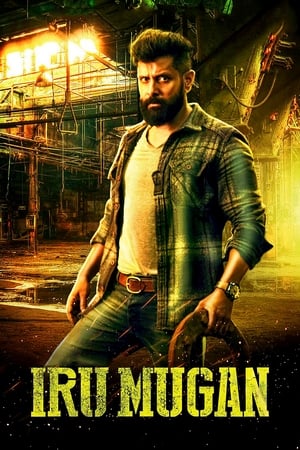
Iru Mugan
If Anand Shankar's previous film Arima Nambi had echoes of K Bhagyaraj's Rudhra, the set-up of his Iru Mugan recalls that of Kamal Haasan's Vikram. An intelligence officer is tasked with investigating and foiling a nefarious plot. The mastermind behind the plot is the man who killed his wife, and he is now conducting his operation from a foreign nation. So, the officer has to go there with a female sidekick in tow and save the day. Here, it is Akilan (Vikram, with beard), a RAW agent who goes after Malaysia to capture Love (Vikram, with prosthetics), an anarchist and a brilliant knowledge about chemicals, to avenge the murder of his wife Meera (Nayanthara, whose character feels underwritten despite a terrific twist). He is accompanied on this mission by Ayushi (Nithya Menen, in a rather minor role), a trainee officer. With Arima Nambi, Anand Shankar showed us that he has a flair for Hollywood-ish action thrillers. Iru Mugan, too, feels like something that Hollywood might have come up with. There is a high-concept involving a super drug that increases one's adrenaline and turns ordinary men into supermen for five minutes. The villain is an over-the-top figure who seems to indulge in evil acts not out of any agenda, but more because he relishes the chaos he can create in the world. There is also a clever twist involving the heroine that is actually borrowed from Fast & Furious 6. The characters look chic and the visuals have a sheen that we don't usually see in our films here. But, unlike the first half of Arima Nambi, where Anand Shankar hardly deviated from the plot, here, perhaps because he is working with a star, he settles for compromises — forced comedy by Thambi Ramaiah, who appears as a cop in Malaysia, that sits uneasily with the seriousness of the hero's mission (it is a stark contrast to what the director achieved with MS Bhaskar in Arima Nambi); a melodramatic character, played by Riythvika, who seems to have dropped in from another film (perhaps Kabali, given that she plays a similar character here); the ease with which Akilan and Ayushi trace the whereabouts of Love, who is built up to be a cunning person; clumsy exposition that is provided through a character (Karunakaran) who seems to exist just for this purpose (the guy works for the villain, but is only too eager to tell everything he knows of his plans to the hero); the several logic leaps (for example, the almost magical recovery by the hero in the climax after taking the super drug, which we are told leaves a person drained for hours after the five-minute mark). And yet, the film works... to an extent. And that is mainly because the director gives an antagonist who is more than an equal to the hero. His Love seemed to be more of an indulgence in the promos, especially because of Vikram's predilection towards gimmicky roles, but the character works in the film, and keeps us in thrall. And the actor nails both the mannerisms and the modulation of this character. The film feels alive whenever this character is on screen, and that is why the second half — despite the implausible scenes — comes across as more engaging than the initial portions.
